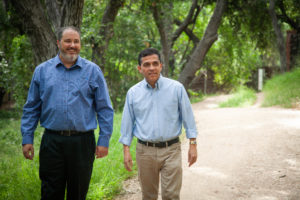The City of La Cañada Flintridge, a California Joint Powers Insurance Authority (JPIA) member agency, is nestled in the Crescenta Valley and offers myriad recreational opportunities for its approximately 20,000 residents. The community, whose total area is less than nine square miles, boasts 23 miles of hiking and horse trails, which are open and accessible to the public.
Trail Immunity (CA Govt. Code Section 831.4) protects public entities from liability for injuries caused by a condition of a recreational trail. Applying to both paved and unpaved or natural trails, the immunity is intended to motivate municipalities to permit recreational use of their property.
“Trail Immunity allows local governments to plan and provide recreational trail opportunities for the benefit of their citizens while taking away the fear of being liable for accidents or injuries that might occur on a trail,” says La Cañada Flintridge City Manager Mark Alexander. “Without this immunity, municipalities may be fearful of providing such recreational opportunities, so the public policy reasons for having the immunity are important to helping improve the quality of life for residents.”
The city considers its trails to be one of the most significant assets of the community for both recreational and healthy living purposes, and invests a significant amount of resources in developing, preserving, promoting, and maintaining its network of trails, which also are linked with the Los Angeles County trails system.
“Because of the sheer number of trails that we and the county provide, the risk exposure to liability is high. Because of heavy usage as well as changing conditions, the risk of erosion, degradation, or alteration is also high,” continues Alexander. “Trail Immunity is important to us because it allows us to maintain and provide trails, both existing and new, without the fear of heightened liability should an accident or injury occur. We wouldn’t have this fantastic trail network without Trail Immunity.”
Many community events and programs, such as the annual Mayor’s Hike and the County Supervisor’s trail ride, take place on the trails. The city also hosts trail restoration events, that offer residents opportunities to work on trails by restoring sections that may have deteriorated or placing signage to remind users to stay on the trail, and works with local Eagle Scout and Gold Scout aspirants on projects that benefit their service goals, the trails, and the community at large.
The city is supported in its efforts by the La Cañada Flintridge Trails Council, a nonprofit, volunteer organization that takes on the roles of informant, collaborator, and ambassador. First and foremost, the Trails Council serves as an informant of trail conditions, alerting staff to trail-related issues so that they may be resolved promptly. Real-time reporting typically is generated through the Trails Council’s “Suggest Trail Repair” interactive web-based form. Having an active reporting system in place allows the city to reduce the dangers or hazards to which users may be exposed. Staff also looks to the Trails Council for guidance on improvements, policy development, and usage protocols. Beyond the day-to-day maintenance needs, the Trails Council provides long term strategies to anticipate where the trails need improvement, where policies need to be developed to keep users safe, and where policies may be necessary on how the trails are being used. As ambassador of the trails, the Trails Council website provides the public an informative platform showcasing trail routes and keeps user groups informed of closures, events, and other issues. The Trails Council also maintains the official trails map.
During his 16-year tenure as city manager, Alexander has observed how technology has enabled users to become more connected and aware of the city’s trails. At the center of this awareness, he says, is an app developed by the Trails Council that allows users to not only pinpoint their exact location and more safely and accurately navigate the trails, but also directly report issues that they come across on their hikes.
The City of La Cañada Flintridge has been a member of the California Joint Powers Insurance Authority (JPIA) since 1986. Alexander, who joined the city staff two years later in 1988, describes the Authority as a self-insurance pool of common-interest cities and public agencies working together to manage their risks and claims. But, he observes, the Authority is more than an insurance pool because its programs, conferences, trainings, and template policies help ensure that members are all practicing accepted best management efforts as they deal with risk and liability exposure.
“The Authority’s greatest value is its knowledge, experience, and expertise,” says Alexander. “The Authority has dealt with practically every type of liability out there and they have a successful track record. They have an excellent training program to impart lessons learned from prior circumstances and cases. They have an excellent panel of attorneys that are well experienced in how to successfully defend in litigation and protect municipalities and their officers. Their training and educational seminars are second-to-none in helping members understand what they could be doing to better manage risk and liability exposure.”
Providing innovative risk management solutions for its public agency partners for more than 40 years, the California Joint Powers Insurance Authority (California JPIA) is one of the largest municipal self-insurance pools in the state, with more than 100 member cities and other governmental agencies. Members actively participate in shaping the organization to provide important coverage for their operations. The California JPIA provides innovative risk management solutions through a comprehensive portfolio of programs and services, including liability, workers’ compensation, pollution, property, and earthquake coverage, as well as extensive risk management training and loss control services.

Photo Caption: Paddy Taber, Senior Management Analyst – Public Works, and City Manager Mark Alexander

